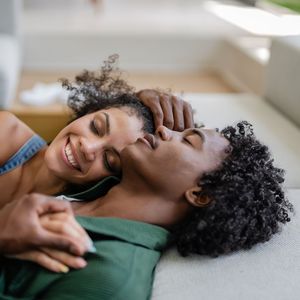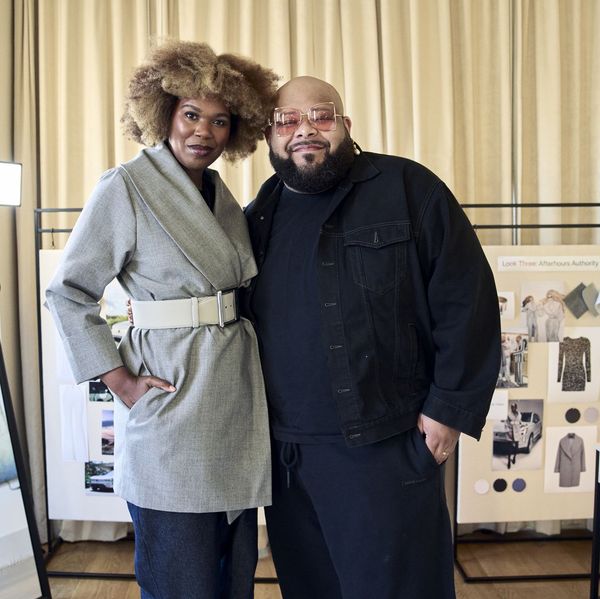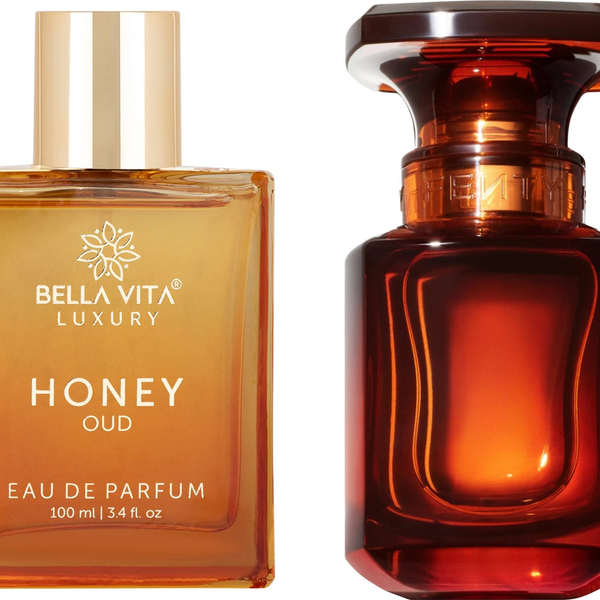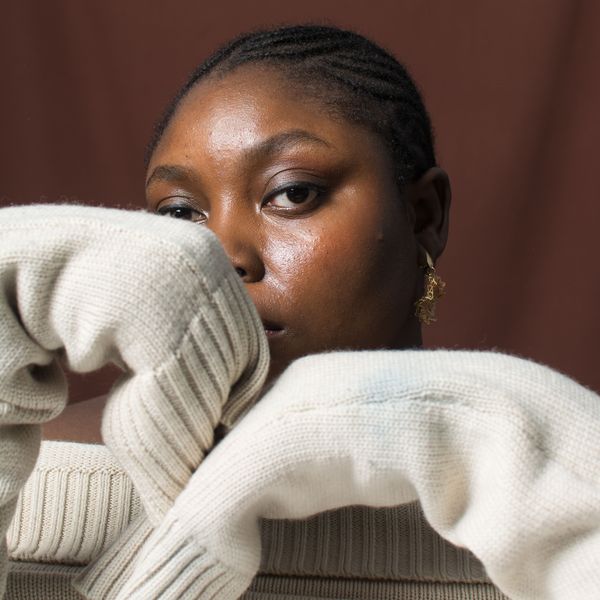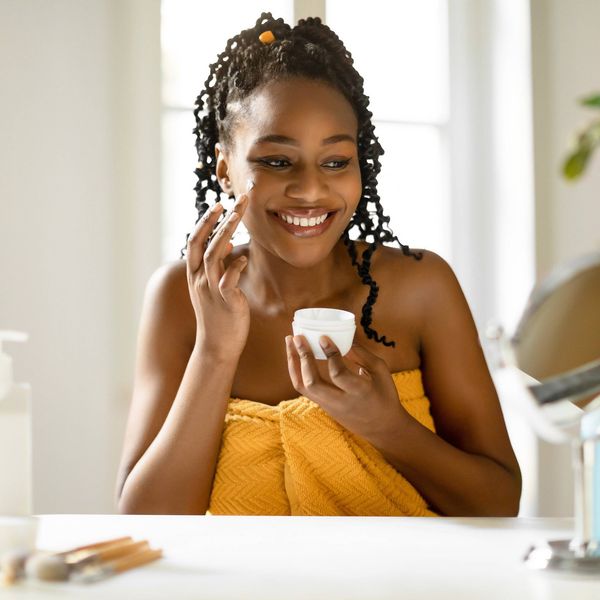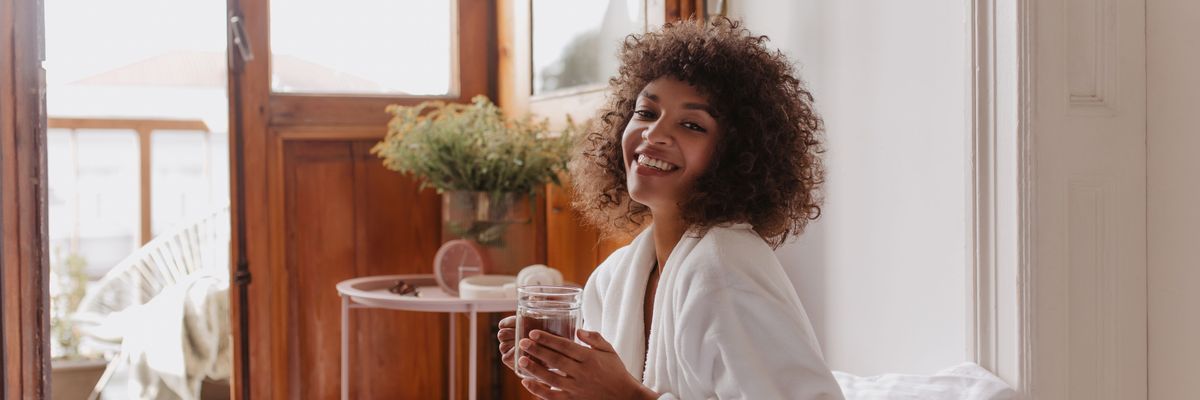
Somebody cue Jahiem's "Age Ain't a Factor" music video, please. Angela Bassett. Cicely Tyson. Gabrielle Union. Adrienne Banfield-Jones (Jada Pinkett Smith's mama). Toni Braxton. Bianca Lawson. Nia Long. Sanaa Lathan. Cynthia Bailey. Karyn Parsons. Sade. Regina Hall. Kimberly Elise. Rozonda "Chili" Thomas. Jill Marie Jones. Mya. Alfre Woodard. Jenifer Lewis. Brandy. Iman. Whew! That's 20 you-definitely-don't-look-your-age women and y'all know good and well that I could go on and on. Indeed, there are a billion-and-one things that make being a Black woman beyond dope, inspiring and relevant. Today, we're going to touch on how well we seem to age.
So, what's up with my title for this article? Yes, there is solid scientific evidence which supports the fact that the high amounts of collagen and melanin (especially if you've got what is known as eumelanin which is what causes someone to have skin of a darker hue) in our skin, coupled with the fact that our bones are denser than a lot of other ethnicities and a lot of us didn't grow up wearing a ton of cosmetics, has resulted in many of us constantly looking 10-20 years longer than we actually are. Still, there are two things to always keep in mind. One, chronological aging is something that none of us can avoid (which is why some people can look 40 for 15 years and then look significantly older all of a sudden). Two, if you don't take care of your skin (and hair and teeth), you can start to age, rapidly and significantly so, no matter how amazing your gene pool is or how much melanin you've got.
That's why I said that "Black can crack" and I stand by that. Many health professionals do as well. What this piece sets out to do is to provide a few tips on how to not take what God (and your parents) gave you for granted so that you can keep looking, as my mother—who also qualifies for the "Wow, you look at least 15 years younger" line up—would put it, not younger than your age so much as representing what your age should be out here lookin' like.
Exfoliate
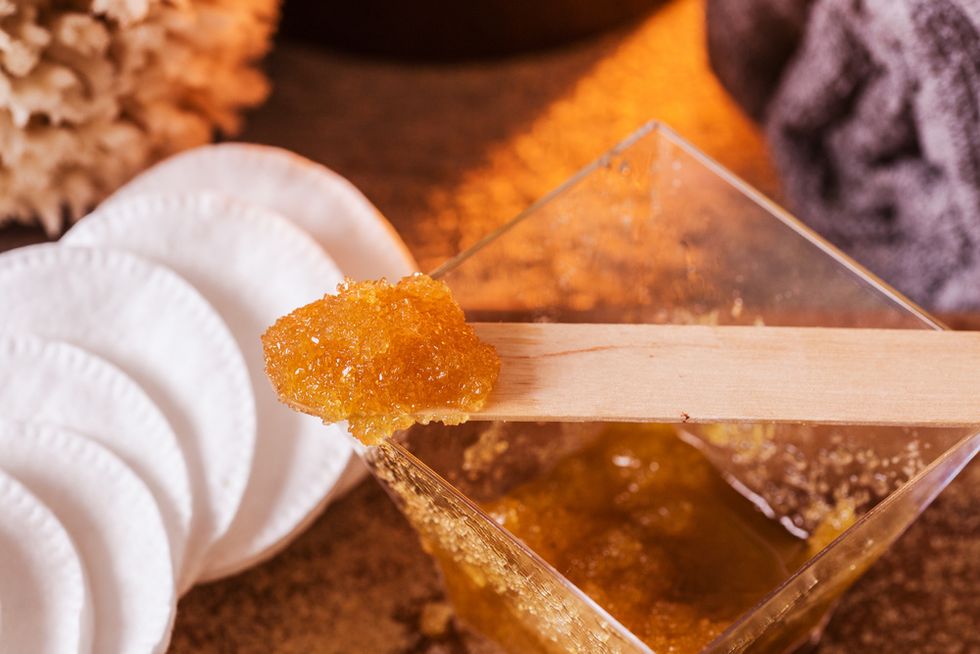
If there are two things that a lot of us struggle with when it comes to our skin, especially as we get older, it would have to be discoloration and dryness. Something that can make this less of an issue is to exfoliate (2-3 times a week unless you have sensitive skin; if that's the case, only do it once a week). Exfoliating is what helps to remove dead skin cells, clear clogged pores and reveal healthy skin. There are plenty of exfoliants on the market that you can buy, but something that I'm a fan of is old-fashioned DIY brown sugar and honey skin scrub. All you need to do is combine ½ cup of brown sugar (it's a humectant that gently exfoliates) with ¼ cup of coconut oil (it's got antibacterial properties), a teaspoon of grapeseed oil (it's loaded with antioxidants) and 2 tablespoons of honey (it's a humectant). Apply this mixture to clean damp skin and you'll notice immediate results after the first use.
Use Sunscreen

If you've always made it a habit of going out without sunscreen because you believe you don't need it, it's time to invest in something like Black Girl Sunscreen SPF 30.
While it's true that many of us grew up with the myth that darker skin doesn't require protection from the sun (not to mention the fact that many dermatologists were not trained on how to properly treat our skin), the reality is we can get sunburned and—this is a greater point—we are four times more likely than white people to be diagnosed with melanoma once it's in its fourth stage (which is very serious).
Also, since overexposure to UV rays can also result in fine lines and wrinkles over time, it's definitely in your best interest to apply sunscreen onto your face as well as your body. Not some of the time; daily.
Eat Food with Collagen in It
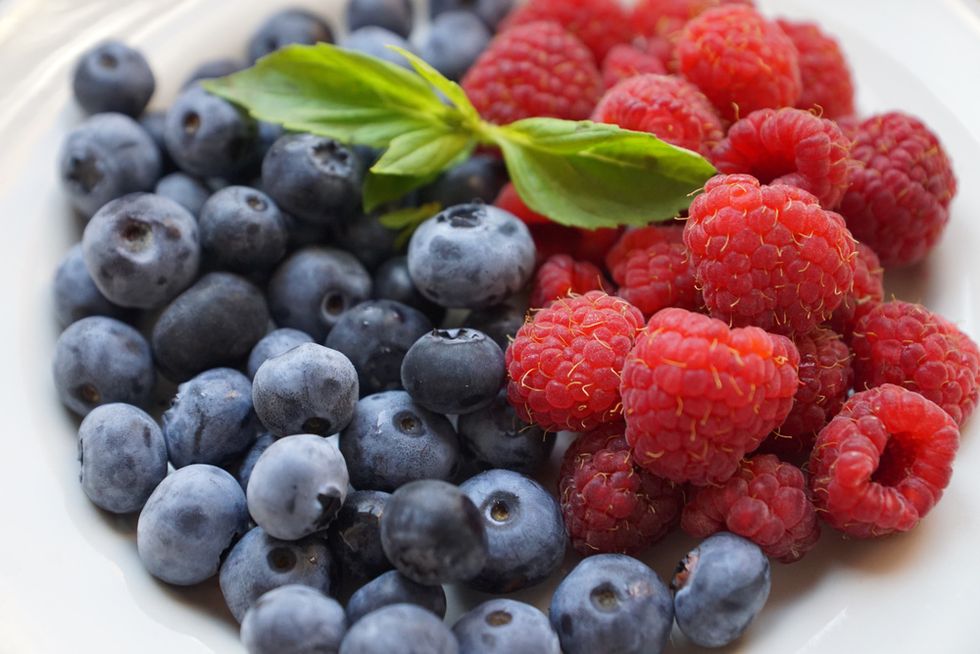
If your skin isn't looking as "tight" as you would like it to (or as it used to appear), it's probably because your system isn't producing as much collagen as it once did. Collagen is a natural protein that strengthens your skin and builds its natural elasticity. The good news is there are collagen supplements that can counteract this issue. You can also eat foods that are high in collagen. Some of those include berries, tomatoes, bone broth, dark leafy greens, fish, citrus fruits and carrots.
Eat Melanin-Producing Foods Too
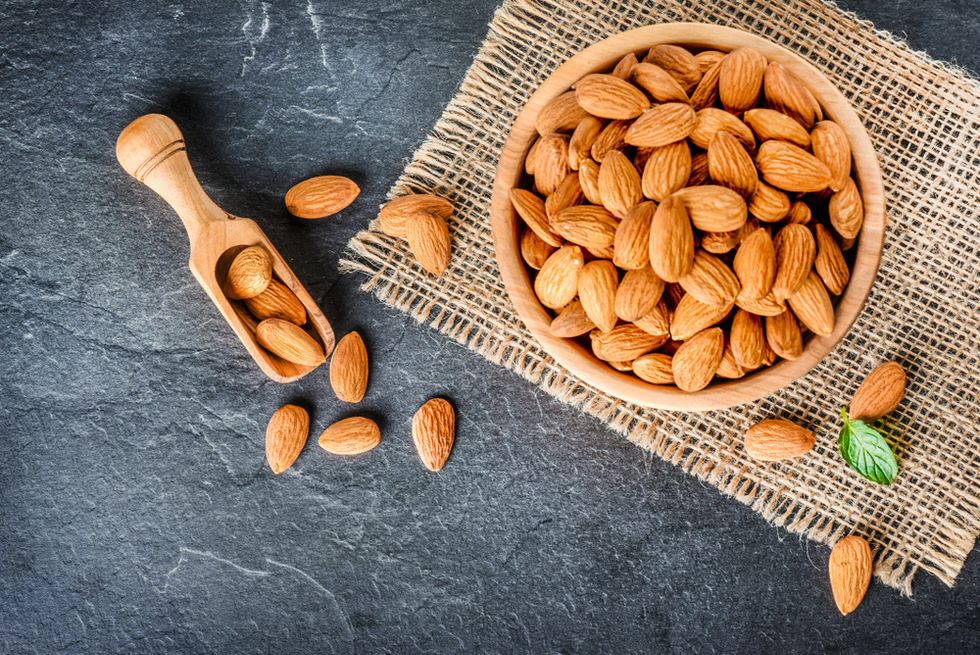
Since melanin is what keeps us looking so good, it makes perfect sense that we should consume foods that help to maintain our melanin levels, right? Come to think of it, the reason why our hair turns grey is because our bodies stop producing the amount of melanin that it once did as we get older. That's why it's also a good idea to intentionally eat foods that can produce melanin in our bodies. I actually wrote an article entitled, "Some Foods Literally Enhance Our Melanin (Who Knew?)" that will help you out with that.
Ease Off of the Perfume and Statement Necklaces
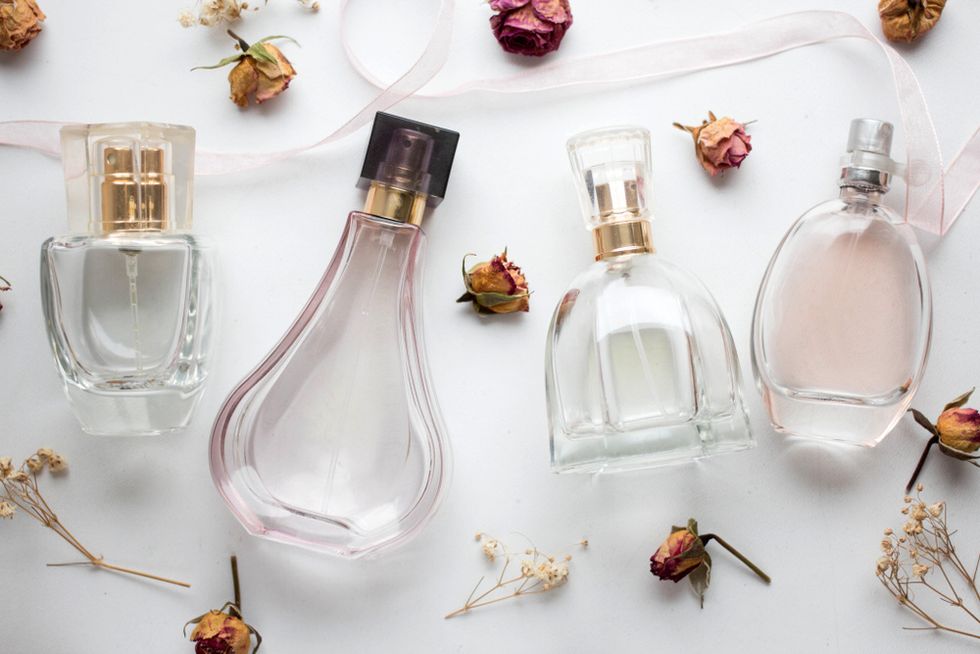
Man. There were about a dozen people who immediately came to my mind when I read up on this particular point. I kinda hate to say it but…you know how they say that if you cut open a tree and count its rings that you'll be able to tell how old it is? A lot of us may look great in the face but our neck still "tells on us" because it's saggy and wrinkly. Two reasons why that could be the case is because of the perfume that we spray on it and/or the heavy jewelry that we wear around it. The reality is that perfume tends to have quite a bit of alcohol in it that can dry our skin out (so you might want to switch over to essential oils). As far as necklaces go, while you might want to wear chunky stuff on occasion, the key is not to do it all of the time; the weight can pull down on your skin which you definitely don't want if you desire to have a youthful-looking neck.
Take a Vitamin D Supplement
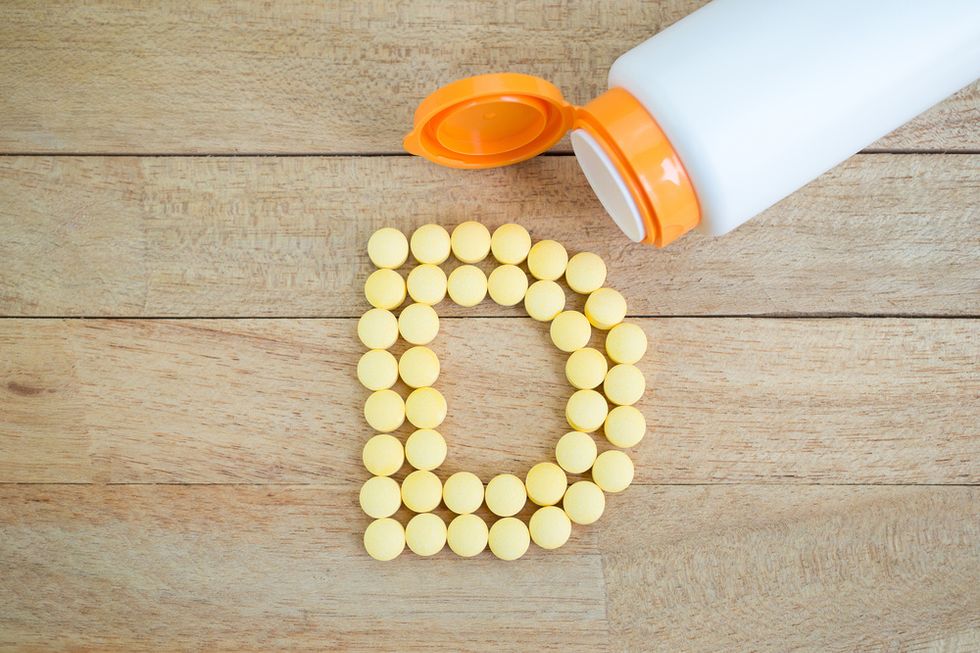
Here's something that might trip you out. The reason why a lot of Black people have a natural Vitamin D deficiency is because our melanin actually hinders the sun's ability to naturally create it in our system.
A lack of Vitamin D not only results in fatigue and bone, back and muscle pain, it can lead to premature hair loss and skin aging too. You can stay on top of this by taking a Vitamin D supplement and/or to eat foods that are high in it. Some of those include salmon, eggs, yogurt, cheese and fortified cereals.
Keep Your Teeth White
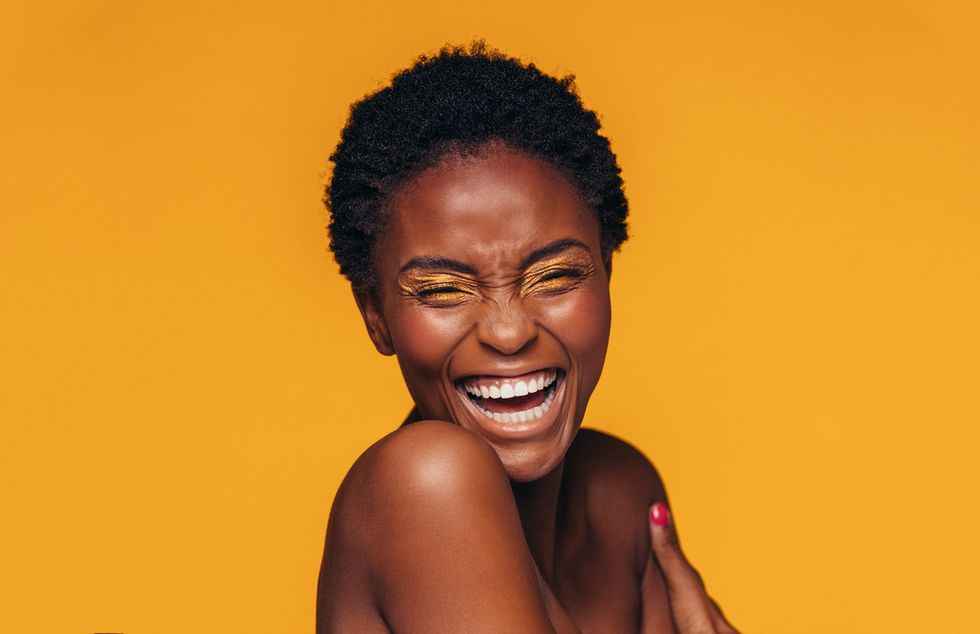
Something else that tends to happen over time is our natural enamel wears off and exposes the dentin that is underneath it. That can, in turn, cause our teeth to have a grey or yellowish tint to it which can also make us look older. Maintaining good oral health can help to keep this from happening. So can cutting back on acidic drinks (like soda and coffee), balancing how much fermented food you consume (it also has acid in it), and keeping your mouth thoroughly hydrated (that keeps bacteria at bay). Also, use a softer bristle toothbrush. Hard bristles can damage your teeth over time too.
Get Some Protein Treatments
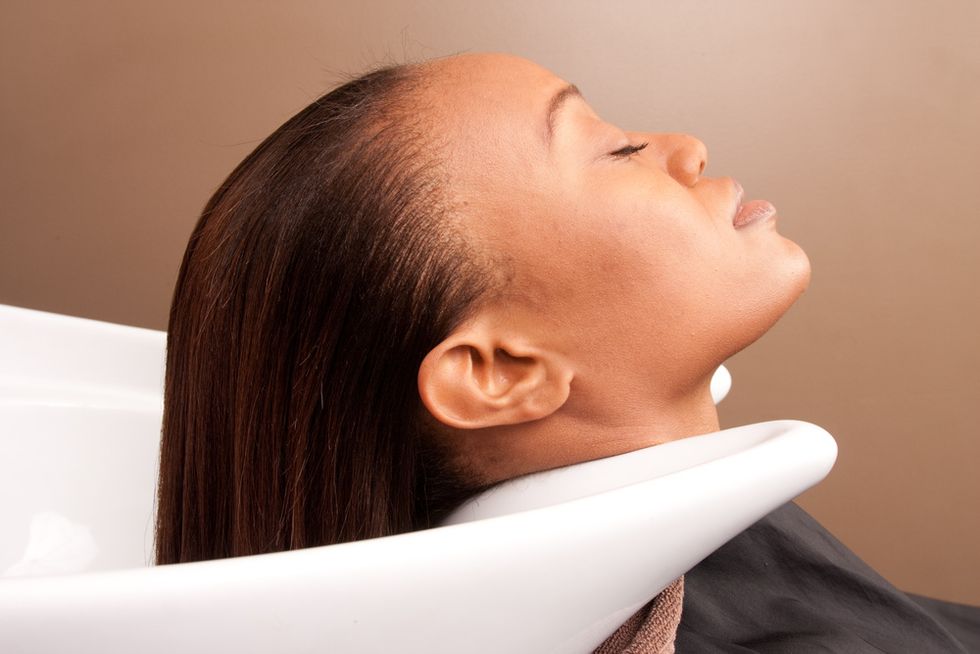
When you end up with grey hair, it has a lot to do with your gene pool. At the same time, being low in protein plays a significant role as well. Our hair is made up of the protein keratin, which is produced less and less, the older we become. That can result in our hair looking thinner and less healthy. That's why it's a good idea to give your hair protein treatments about every six weeks. Also, because nails are made up of keratin and they can become drier and more brittle over the years, make sure that you eat foods that are high in protein (yogurt, spirulina, oats, quinoa and poultry), and that you regularly apply a nail strengthener to your nails too.
Drink More Water
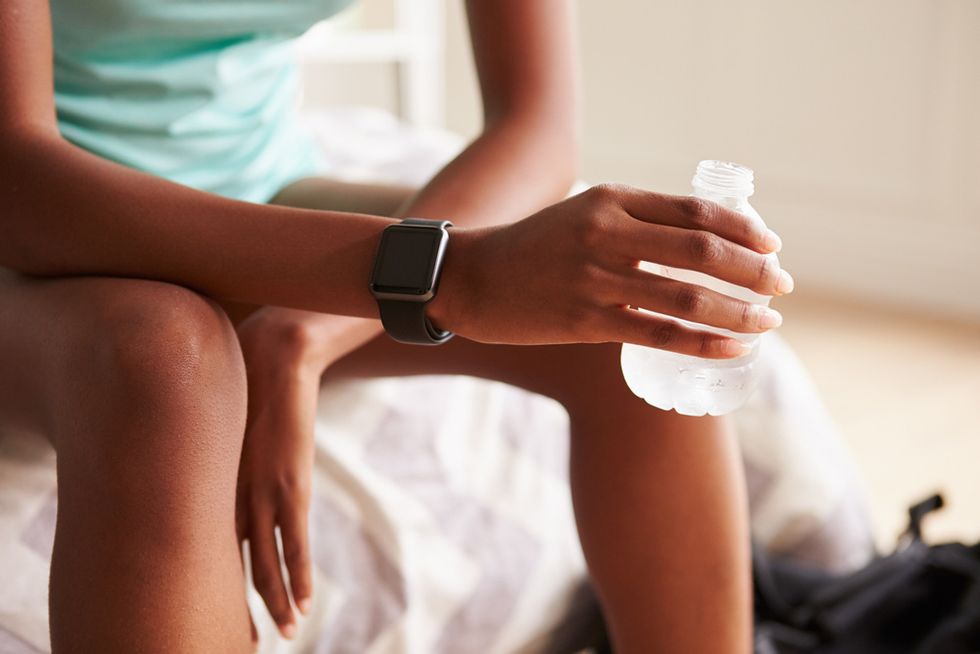
It would take another article entirely to cover all of the benefits that come with drinking water. As far as your skin goes—it removes toxins, hydrates you (so that you have less fine lines and wrinkles), reduces puffiness, speeds up the healing process, balances the sebum in your skin (which makes your pores appear smaller) and, it also makes your skin look fuller and plumper; this, in turn, causes you to look younger in the process.
Sleep on Your Back More Often
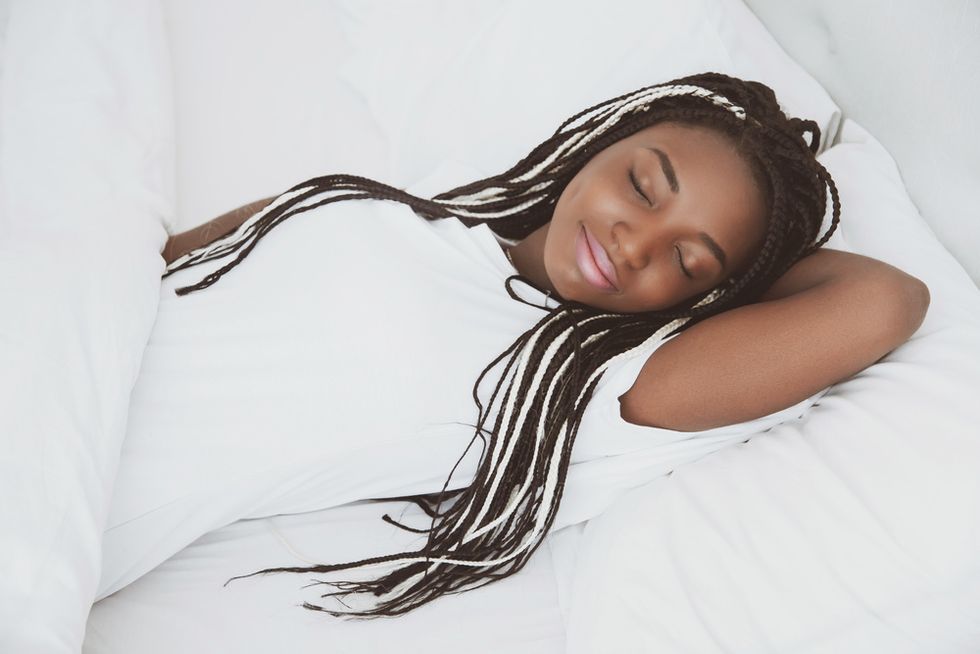
I've got to admit that this is something I need to work on. While I prefer to sleep on my side, doing that (and sleeping on your stomach) can also age you. How? Well, if you ever wake up and see lines on your face, don't just chalk that up to simply being a minor result of being on your sheets and pillowcases all night; it's actually a foreshadowing of where wrinkles can occur. That's because putting that kind of pressure on your face for hours on end can create creases and crinkles over time. That's why it really is your best bet to sleep on your back as much as you can. You lower the "risk" of fine lines, you allow the fluid in your face to properly drain and, you can keep the bacteria that's on your bedding from infecting your pores—and all of this can help you to "keep your Black from cracking" for many years to come.
Want more stories like this? Sign up for our newsletter here and check out the related reads below:
10 All-Natural Ways To Strengthen Your Teeth & Whiten Your Smile
These Foods Will Give Your Skin & Hair The Moisture They Crave
Chilli And Mýa Share Their Secrets For Remaining Flawless And Fabulous
Featured image by Nappy
- All-Natural Ways To Make Pores Smaller - xoNecole: Women's Interest, Love, Wellness, Beauty ›
- Add These Drinks to Your Beauty Routine - xoNecole: Women's Interest, Love, Wellness, Beauty ›
- 12 Foods That Legitimately Reduce Signs Of Aging - xoNecole: Lifestyle, Culture, Love, Wellness ›
- The 10 Best Sunscreens For Dark Skin - xoNecole ›
This Is How To Keep 'Holiday Season Stress' From Infecting Your Relationship
Hmph. Maybe it’s just me, but it seems like there is something really weird happening in the fall season air (because winter doesn’t officially begin until December 21) that cuddle season is in full swing while break-up season is as well. In fact, did you know that break-ups are so popular during the holiday season that December 11 is deemed Break-Up Day?
The reasons why relationships shift around this time vary; however, I did both roll my eyes and chuckle when I read that a very popular one is because it’s an easy way to get out of getting one’s significant other a Christmas present. SMDH.
Anyway, I personally think that the less shallow folks out here may contemplate calling things “quits” or they at least distance themselves a bit from their partner (and what I’m referring to is serious relationships) due to all of the stress and strain that oftentimes comes with the holidays whether it be financial, familial, due to their tight schedules or something else.
Listen, I would hate for you and your man to miss the fun and happiness of experiencing this time of year, all because you are so overwhelmed or irritated that you can’t really enjoy it. That’s why I have a few practical tips for how to avoid allowing the typical holiday season stress from INFECTING your relationship.
Manage Your Expectations
 Giphy
GiphyUnmanaged expectations. If there is a main reason why the holiday season tends to be so stress-filled for so many people, I’d bet good money that this is the cause. And when you’re in a long-term relationship, expectations can manifest themselves in all sorts of cryptic and/or unexpected ways. You might have relatives who assume that you are going to be with them for Thanksgiving or Christmas when you have other plans in mind. You might be thinking that you are going to spend one amount for presents while your man is thinking something totally different. When it comes to scheduling, your signals may be crossed.
And you know what? To all of these scenarios, this is where clear and consistent communication come in. Don’t assume anything. Don’t dictate anything either. From now until New Year’s, mutually decide to check in once a week, just to make sure that you are both on the same page as it relates to the holidays and what you both are thinking will come along with it. The less blindsided you both feel, the less stressed out you will be. Trust me on this.
Set (and Keep) a Budget
 Giphy
GiphyOkay, so I read that last year, 36 percent of Americans incurred some type of holiday-related debt. Hmph. Last year, there was still some sense of normalcy in this country, chile, so I can only imagine what finances are gonna look like over the next several weeks. That said, since I don’t know a lot of people who don’t find being broke stressful, make sure that you and your bae set a budget and then stick to it this year — no ifs, ands or buts.
Because really, y’all — it doesn’t make sense to deplete savings and/or max out credit cards for a few days of giggles only to be damn near losing your mind because you don’t know how to make ends meet come Dr. Martin Luther King, Jr. Day.
And by the way, this tip doesn’t just speak to things like food and gifts; I also mean travel. If it doesn’t make a ton of sense (or cents) to be all over the place this year — DON’T BE.
Keep Matthew 5:37 at the Forefront
 Giphy
GiphyIf off the top of your head, you don’t know what Matthew 5:37 says, no worries, here ya go: “But let your ‘Yes’ be ‘Yes,’ and your ‘No,’ ‘No.’ For whatever is more than these is from the evil one.” That verse right there? Oh, it’s a boundaries lifesaver! I say that because do you see “maybe” or “I’ll think about it” in there? Nope. LOL. It says that you should tell people “yes” or “no” and leave it at that — and that complements Anne Lamott’s quote, “’No’ is a complete sentence” impeccably well. Yeah, you’ve got to remember that anything beyond a yes or no to a request is privileged information; you don’t owe anyone details or an explanation.
Besides, if you are really honest with yourself, when someone asks you something and you give a “Umm, let me think about it” kind of reply, more times than not, you already know what your answer is going to be — so why not let you both off of the hook? Give your response. Commit to that. And let everyone (including yourself) get on with their lives and schedules.
I promise you that when it comes to those holiday parties, you are pissing more folks off by not RSVP’ing or doing so and not showing up than just saying, “Thank you but not this year” off the rip.
Remember That Your Personal Space Is Privilege Not a Right
 Giphy
GiphyA friend of mine recently bought a new house and invited me over to come see it. He’s a single man with no children, so as I was taking in all of the space that he had, especially as I walked through his finished basement, I joked about relatives coming to live with him. “Hell no” and “absolutely not” were pretty much his immediate responses as he went on to say that some folks even had the nerve to be offended when he told them that he had no intentions on taking DNA in.
Ain’t it wild how people think that your stuff is their right? And yes, that brings me to my next point. Your home is your sanctuary space. If you want to host folks this year — cool. If not, ALSO COOL. Please don’t let folks (family included) guilt you into how they want you to act or even into what they would do if the shoe was on the other foot. You are not them — and as one of my favorite quotes states, “If two people were exactly alike, one of them would be unnecessary.” (A man by the name Larry Dixon said that.)
Hell, my friends? They know that I am good for sending them random things that they need or even want all throughout the year. Coming over to hang out at my pace, though. Uh-uh. Chalk it up to being a card-carrying member of the ambivert club yet I like keeping my living space personal — and I sleep like a baby, each and every night, for feeling that way.
Always remember that your space, your time, your resources, your energy and shoot, yourself period (including your relationship), are all things that are your own. You get to choose how, when and why you want to share them. The holiday season is certainly no exception.
Cultivate Some “You Two Only” Traditions
 Giphy
GiphyIt’s not uncommon for some couples to hit me up after the holiday season to “detox.” Sometimes it’s due to the financial drama (and sometimes trauma) that they experienced. Sometimes it’s because they allowed their relatives (especially in-laws) to get more into their personal business than they should’ve. More than anything, though, it tends to be because they didn’t get enough quality time together and so ended up feeling “disconnected.”
Please don’t let that happen. Listen, I’m not even a holidays kind of woman and yet, I will absolutely sit myself down with some hot chocolate and chocolate chip cookies to enjoy a Hallmark holiday film or two. Aside from the fact that most of them are lighthearted and sweet, I also like that they usually focus on couples loving on each other amidst all of the holiday beauty and ambiance — which is something that all couples should set aside some time to do.
Maybe it’s a vacation. Maybe it’s a staycation. Or maybe it’s my personal favorite, A SEXCATION. Whether it’s for a few days, the weekend or even overnight — don’t you let the holidays go by without setting aside time for you and your man to celebrate one another. Don’t you dare (check out “Are You Ready To Have Some Very Merry 'Christmas Sex'?”).
GET. SOME. REST.
 Giphy
GiphyI once read that 8 out of 10 people get stressed out over the holidays and 3 out of 10 lose sleep during to it — and when you’re stress-filled and sleep-deprived, that can absolutely lead to hypersensitivity, making mountains out of molehills and even not being in the mood for sex.
Your relationship can’t afford to go through any of this, so definitely make sure to prioritize rest. I don’t care how unrealistic it might seem during this time, sleep should never be seen as a luxury; it will always and forever be a great necessity.
That said, try to get no less than six hours of shut-eye in (check out “6 Fascinating Ways Sex And Sleep Definitely Go Hand In Hand”) and even ask your bae to take a nap with you sometimes (check out “Wanna Have Some Next-Level Sex? Take A Nap, Sis.”). Not only will sleep help to restore your mind, body and spirit but, when it’s with your partner, it’s an act of intimacy that can make you both feel super connected, even in the midst of what might feel like chaos.
___
Holiday season stress is real. Still, never give it the permission or power to throw your relationship off. Put you and your man first and let the holidays be what they are gonna be, chile.
Let’s make things inbox official! Sign up for the xoNecole newsletter for love, wellness, career, and exclusive content delivered straight to your inbox.
Featured image by Shutterstock
Whew. Did you know that somewhere around 122 million Americans travel during the holiday season? Listen, I went to see my godbabies this past September and got caught up in a crazy ass traffic jam at BNA (the Nashville airport) that damn near has me considering air travel ever again — especially during this time of the year.
Besides, it’s not like it’s a written rule that you have to travel over the holidays. In fact, if you want to play it chill this year, why not enjoy a staycation instead? Although it might seem like it’s a “poor man’s compromise,” as you’re about to see, it actually…isn’t.
1. Go All Out with the Christmas Décor
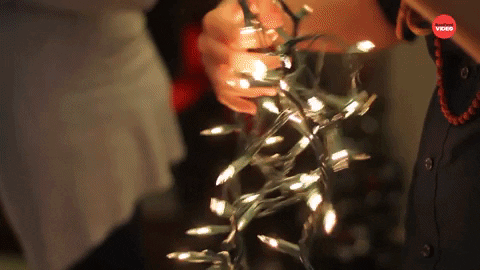 Giphy
GiphyThere is someone I know who is so obsessed with Christmas, she’s damn near annoying-borderline-terrifying. I’m. Not. Kidding. Yet hey, if you’re going to do a holiday-themed staycation (emphasis on “holiday-themed”), that’s kind of how you’ve got to be. Some décor ideas include:
- A fresh Christmas tree (is the most ideal) that is ultimately decorated
- Wreaths on outside and inside doors
- Garland (with twinkle lights) in predictable and unpredictable places
- Poinsettias
- Mistletoes
- Snow globes
- A stocking (with some of your favorite things in it)
- Fake snow
- Stars
- Angels
- Candy canes
- A BLACK Santa (LOL)
I mean, since you are going to be spending a lot of time at home, it can feel like a mini-winter wonderland if you are intentional about doing more decorating to your living space than you ever have before!
2. Buy a Couple of Christmas-Themed PJs
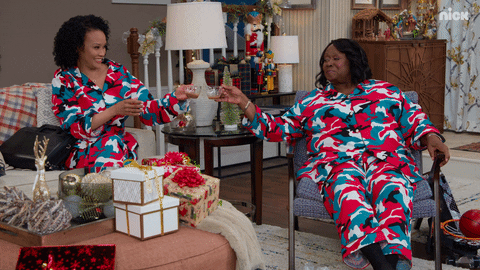 Giphy
GiphyWhile I was doing some research on a totally different topic, I happened upon an article that talked about the psychology behind why we should be intentional about what we wear to bed. When you stop to think about the fact that (hopefully) you are sleeping somewhere between 6-8 hours every night, it would make sense that things like the color and fabric of your sleepwear would have a real impact on you — even subconsciously.
Well, when it comes to Christmas décor, specifically, not only does it take you back to nostalgic memories, it can also boost your moods. So, aside from being on-10 with your Christmas décor, also invest in some Christmas-themed PJs. Since you’re going to be doing a lot of lounging around (RIGHT?), do it in something that makes you think about all of your favorite things about this time of year.
3. Cop Some Christmas-Scented Candles
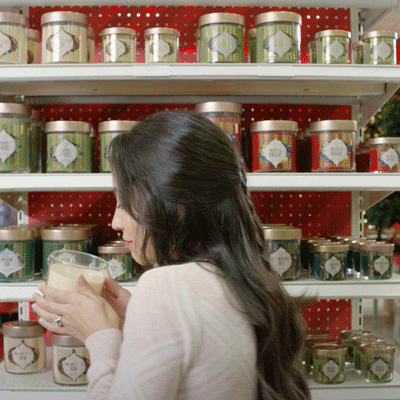 Giphy
GiphyThere really is no telling how many articles that I’ve written where I am singing the praises of scented soy candles. Candles are soothing, comforting and a very easy way to reduce stress. Also, since it gets darker quicker and for a longer period of time around this time of the year, candles provide a relaxing vibe to your home. Since it is Christmastime, go with scents that are reminiscent of the season:
- Cinnamon
- Vanilla
- Cranberry
- Apple
- Pine
- Frankincense and Myrrh
- Peppermint
- Cashmere
- Ginger(bread)
- Orange
- Sugar Cookies
- Sandalwood
- Cloves
- Cedarwood
- (Hot) Chocolate
Personally, one of my favorite candle companies is Goose Creek. Their signature collections will have your entire house smelling like a high-end bakery. No exaggeration.
4. Play Some Winter-Themed ASMR Sounds
 Giphy
GiphyI’m from Nebraska and my mother was a New Yorker. So, if there is one thing that I like, it’s seasons and that includes snow during wintertime. Unfortunately, Nashville is cray-cray when it comes to that. If, where you live, the weather is all over the place too (which is why I think it’s insane that some people still give pushback to global warming) and you would like for it to at least seem like you are in your own winter wonderland — invest in some fake snow to strategically place around your home.
Oh, and don’t forget to turn on some winter-themed ASMR sounds too. YouTube has videos that run for hours on end that feature blizzards and howling winds that really can make you feel like you are in the midst of an ice storm.
5. Host a Holiday Movie Marathon
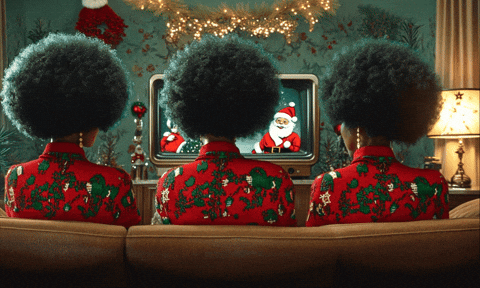 Giphy
GiphyOne thing to remember about a staycation is it doesn’t mean that you have to be alone or that the only people who can participate are the ones who live with you. Since a staycation is simply about staying close to home instead of traveling afar — absolutely consider having some of your favorite people over for a holiday-themed movie marathon. Shoot, Black America Web even did you a solid by publishing “25 Best Black Christmas Movies Of All Time;” plus, Tubi has a Black holiday hits section of indie films too.
Oh, and make sure to get creative with the Christmas-themed snacks. Some ideas? Some Kentucky-fried turkey tenders with cranberry hot sauce (recipe here), some Holiday Hot Spinach Dip (recipe here), some Grinch Kabobs (recipe here), some roasted pecans (recipe here) and some Pomegranate Guacamole (recipe here).
6. Spend a Night (or Two) at a Hotel or Vacation House
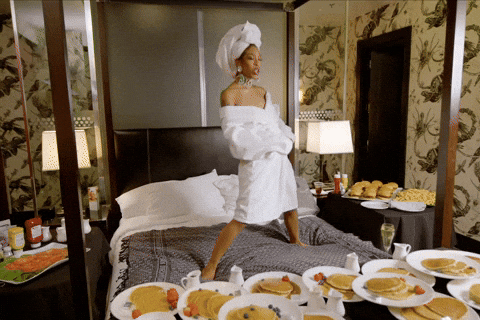 Giphy
GiphyJust like you don’t have to be alone during a staycation, you also don’t have to be cooped up in your house the entire time. Get a change of scenery in your own city by spending the night in a hotel that you’ve always wanted to try out or renting a vacation house for you and some of your folks to hang out in during the time between Christmas and New Year’s Day. I have a “love little sister” who does this randomly when she needs a break from her work as a therapist. She says that it’s damn near like taking a trip (and she has PLENTY of passport stamps; trust me).
7. Have Brunch or Dinner at a Christmas-Themed Restaurant
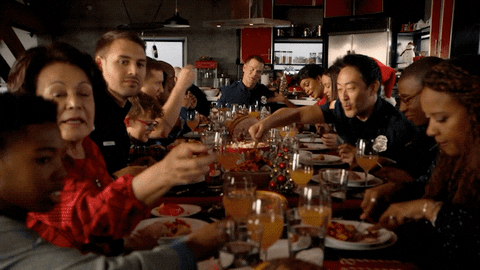 Giphy
GiphyIf nothing puts a bigger smile on your face than the thought of DoorDashing meals and barely even touching your stove during your staycation — hey, I am right there with you. Do consider going out to brunch or dinner during your chill time, though. It’s another way to bond with people and create some current holiday memories. And if you’ve got a bae and you opt for dinner, it can be a wonderful type of Christmas-themed date.
8. Go to a Holiday-Themed Concert
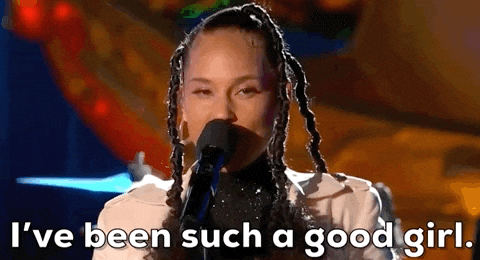 Giphy
GiphyBeing that I got my start as an entertainment writer, hear me when I say that I’m not someone who just has to go to a live concert every chance that I get. Oh, but baby, when I saw that El DeBarge was doing a City Winery tour and he was going to be here right before Christmas — I booked myself a ticket quick, fast and in a super-duper hurry! Shoot, I didn’t even want to go with someone because I plan to give him and that falsetto voice of his my complete and undivided attention. LOL.
I don’t know what it is about the holiday season that makes live music that much more enjoyable — but if there is a concert that features one of your favorite artists happening right through here, consider that to be a cool way to “tour your city” while cultivating a really awesome memory at the same time.
9. Also, Go Ice Skating
 Giphy
GiphyOne of my fondest memories of time with my father is going ice skating. We actually would do it in the summer (because that is when I would visit him) and, every year, he would get me a new ice skating outfit. Even now, when I watch someone ice skate (even in movies; like in the classic movie Garden State), I will have warm fuzzies.
Anyway, if you’ve never been before, go. If it’s been forever since you have, also go. There is something that is very sweet and so signature Christmas about it. Plus, it’s a top-tier form of exercise.
10. Take a Christmas Lights Tour
 Giphy
GiphyAnother one of my favorite Christmas memories is driving through neighborhoods and looking at the Christmas lights. And just like a Christmas concert can be a form of hometown touring, so can doing this if you decide to choose a couple of areas where you’ve never really been or rarely frequent.
Now are you excited about the thought of experiencing a holiday-themed staycation?
I thought you would be. ENJOY!
Featured image by Shutterstock


